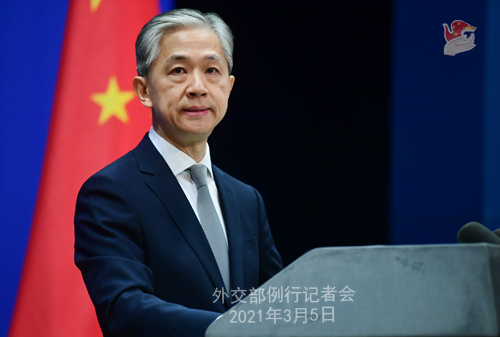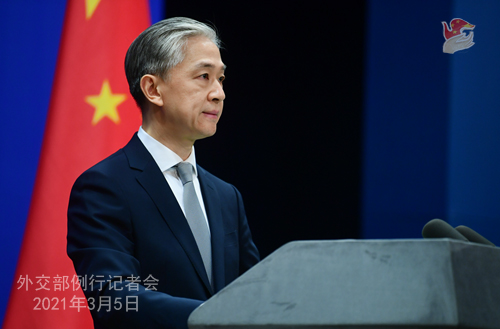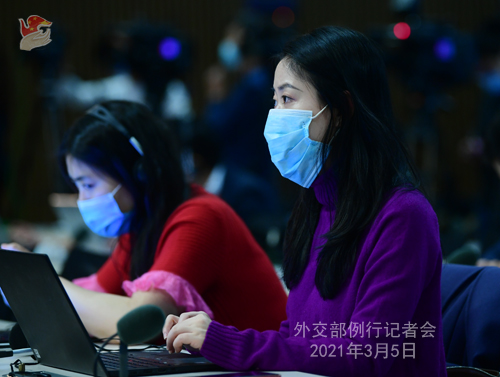| Foreign Ministry Spokesperson Wang Wenbin's Regular Press Conference on March 5, 2021 |
| 2021-03-05 18:42 |
|
CCTV: The Brookings Institution, an American think tank, published an article the other day, calling for US-China cooperation in the fight against the pandemic. The urgent task of bringing the pandemic under control can only be accomplished through global coordination, which requires the active engagement of the two largest economies in the world, the article said. What is China's comment on this? Wang Wenbin: I've noted relevant reports on this article. Also, at an exchange event recently held between Chinese and American experts on epidemic prevention and control, they agreed that defeating COVID-19 requires global efforts in the spirit of unity and cooperation. The international community appeals for solidarity in the fight against the pandemic, and clear-sighted people want to see better cooperation between China and the US on this front. Since the outbreak of the pandemic and after the Chinese government has taken the lead in effectively curbing the virus, we have been actively promoting international anti-epidemic cooperation, including in ensuring the production and supply of global anti-epidemic materials. As far as I know, from March 1, 2020 to February 28, 2021, China has exported to the United States about 43.85 billion masks, 1.19 billion pairs of surgical gloves, 950 million sets of protective clothing, 54.03 million pairs of goggles and 17,585 ventilators. Many provinces, cities, enterprises and organizations in China have also offered medical supplies to the United States. Chinese experts, medical workers and non-governmental organizations shared their prevention and treatment experience with their counterparts in the United States. Chinese and American pharmaceutical companies and people from the scientific and technological community have also maintained communication and cooperation on vaccine and drug research and development. At present, the pandemic is yet to be contained. As two major countries in the world, China and the United States should join hands to meet the common challenges of mankind. China will continue to work with other countries, including the United States, to support WHO in further playing its role to further advance international cooperation for an early victory in the fight against the epidemic. Bloomberg: A follow-up on COVID-related issues. A group of scientists have called for an "independent probe" into the origins of COVID-19. The group of scientists said in an open letter published by the WSJ that the existing WHO mission isn't independent enough, and that half of the team are Chinese citizens whose scientific independence might be limited. I'd like to ask for the foreign ministry's comment on this. Wang Wenbin: First I need to correct you on one point. What China and the WHO conducted was not a probe, but joint research on origin-tracing, which forms part of a global plan. The joint team of experts gave detailed information on their cooperation in origin-tracing at a press conference held on February 9. If any country or media failed to grasp the details accurately, I refer them once again to the information released at that press conference. I'd like to stress the following: First, the list of international experts on the WHO mission was formulated solely by the WHO. They are independent as scientists and highly representative as they are from more than ten countries and international institutions such as the WHO, the World Organization for Animal Health and the Food and Agriculture Organization. Second, the Chinese government has done a lot of administrative, technical, logistic and supporting work. In support of this joint research, the Chinese side, at the request of the WHO and the international team, arranged top Chinese experts in relevant fields to take part, and assembled a large number of technical personnel to support the joint mission in collecting data and documents. The experts on the mission made their own decisions independently as to where they would like to visit, who they would like to talk to and what they would like to talk about as the field work proceeded. The report is also drafted by the mission independently. Third, the cooperation on origin-tracing is a scientific task carried out by the joint mission of both Chinese and foreign experts based on scientific research and facts. The experts of the two sides had full and candid exchanges, and the conclusion reflected the consensus of both sides, which is objective, scientific and authoritative. In disregard of scientific facts, some people have politicized the issue of origin-tracing, misinterpreted the scientific conclusion and report of the joint mission, and kept instigating an investigation with presumption of guilt against a specific country. Such a behavior is not conducive to international anti-epidemic cooperation. These signatories can deceive no one, including themselves, as to whether their so-called "open letter of scientists" is a true proposal for scientific and professional origin-tracing or pursuit of political agenda with presumption of guilt. Fourth, since there have been more reports worldwide on the coronavirus appearing in various places around the world in the latter half of 2019, it is getting increasingly urgent and necessary to conduct similar visits to other countries and regions. We hope that relevant parties will demonstrate the same science-based and cooperative attitude as China does in coordinating with WHO on origin-tracing work. China will continue to work with the WHO and the international community on origin-tracing in an open and transparent manner, so that humanity can achieve an early victory over the pandemic and be better prepared to future public health emergencies.
Beijing Daily: The 155th session of the League of Arab States Council at the level of foreign ministers adopted a China-related resolution on March 3, which reiterated the importance to strengthen China-Arab ties, their welcome to Saudi Arabia's hosting of the first Arab-China summit, and appreciation to the two sides' anti-epidemic cooperation. They also stressed the need to hold institutional events under the framework of the China-Arab States Cooperation Forum (CASCF). Do you have any comment? Wang Wenbin: China highly appreciates the resolutions adopted by successive meetings of the League of Arab States Council at the level of foreign ministers on strengthening relations with China for many years. This fully demonstrates the firm determination of Arab states to develop relations with China and the high level of China-Arab traditional friendship and strategic partnership. China attaches great importance to developing relations with Arab states and sees the League of Arab States as an important partner in advancing China-Arab relations. In recent years, China and Arab states have deepened strategic mutual trust and achieved fruitful results in cooperation across the board. In particular, in the fight against COVID-19, the two sides have worked together and helped each other, setting an exemplar of solidarity in fighting the epidemics. Going forward, China is ready to step up communication and coordination with Arab states and the League of Arab States, make good preparations for the China-Arab Summit, join hands to build a China-Arab community with a shared future in the new era, and aim for new stride forward in the China-Arab strategic partnership for the benefit of our two peoples. Global Times: It is reported that UN human rights experts said that the United States' unilateral sanctions on countries including China, Russia, Cuba, Iran and Venezuela severely violate these countries' human rights. They called on the United States to fully comply with the international human rights treaty and prevent any negative impact such sanctions may have on those countries' human rights. What's your comment? Wang Wenbin: China noticed the statement made by UN human right experts. In disregard of the purposes and principles of the UN Charter and norms governing international law, certain country launched unilateral sanctions against other countries by wantonly citing human rights as an excuse. Such moves are widely criticized by the international community. Facts abound to prove that unilateral sanctions gravely impact the international political and economic order and the global governance system, severely undermine thee sanctioned countries' efforts to mobilize resources, grow their economy and improve people's well-being, threaten their rights to life, self-determination and development, and constitute continuous, systemic and large-scale violation of human rights. What's more, with the on-going COVID-19 pandemic, unilateral sanctions have led to shortages of food and medicines for tens of millions of people, endangered the health and life of numerous people, especially the vulnerable groups, and exacerbated poverty, hunger and inequality. China is consistently opposed to unilateral sanctions. We urge the relevant country to heed the just voice of the international community and immediately stop imposing unilateral coercive measures. Bloomberg: A couple of questions about Hong Kong. My first question is, why does Beijing feel the need to change the Hong Kong electoral system and what specific elements does Beijing want to change about the elections? Critics are saying that both Beijing and Hong Kong governments are using these election changes to disadvantage political opposition in Hong Kong. What are your responses? Wang Wenbin: This morning, Wang Chen, Vice Chairman of the NPC Standing Committee, delivered an explanatory speech on a draft decision on improving the electoral system of the Hong Kong Special Administrative Region (HKSAR). Last night, Zhang Yesui, spokesperson of the fourth annual session of the 13th NPC, also answered a relevant question at his press conference. I suggest you refer to their statements. I must point out that Hong Kong's electoral system is part of China's sub-national electoral systems, as Hong Kong is China's special administrative region. Thus, its design, development and improvement is totally China's internal affairs. In a unitary state, the central government makes decisions for sub-national units regarding their electoral systems, a political practice commonly enshrined in their constitutions. China's position on Hong Kong-related issues has been understood and supported by most members of the international community. The Chinese side is firmly determined in safeguarding national sovereignty, security and development interests, in implementing "one country, two systems," "Hong Kong people governing Hong Kong" and a high degree of autonomy, in safeguarding Hong Kong's prosperity and stability, and in opposing foreign interference in Hong Kong's affairs. No one will stand the slightest chance in meddling in Hong Kong affairs and exerting pressure on China. ******************** State Councilor and Foreign Minister Wang Yi is scheduled to meet the press on the afternoon of March 7 on the margins of the fourth session of the 13th National People's Congress, where he will take questions from the press on China's diplomacy and foreign relations. Please stay tuned.
|
| |||||||||||||||
|
|||||||||||||||




